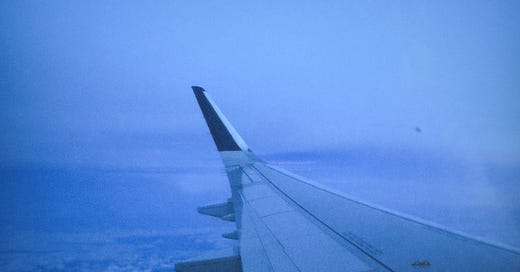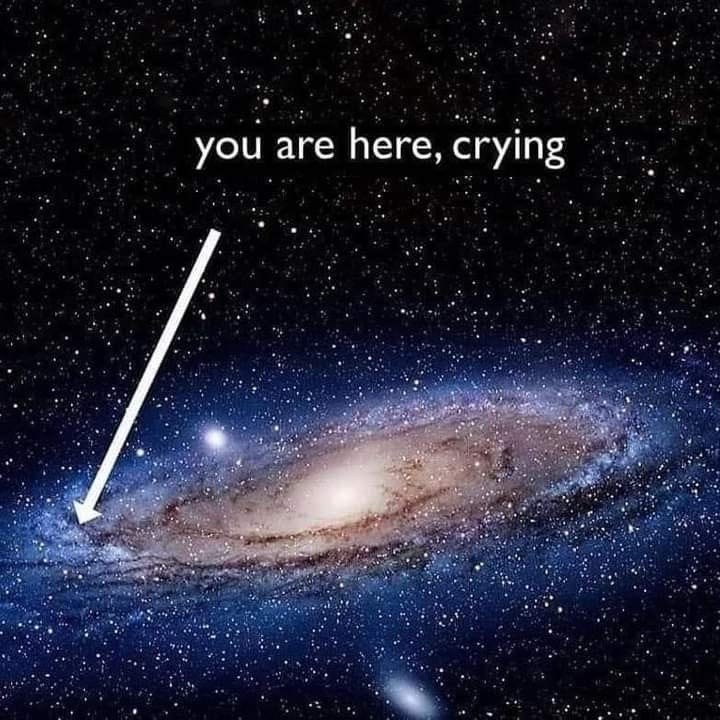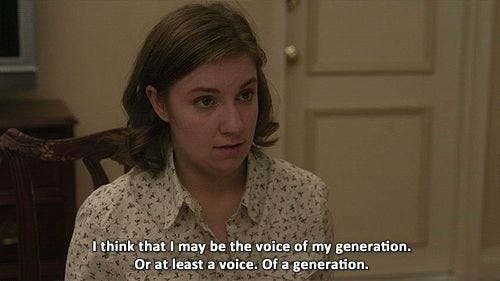mood reading: you're staring out of an airplane window at 35,000 feet
you'll never get closer to your origins as space dust hurtling through the cosmos than this!
I’ve been flying regularly my whole life, but this year so far, I cannot seem to go any short stretch of time without getting on a plane. Which seat I choose depends, though. On a short flight, I take the aisle; anything longer than four hours, I’d often prefer to squish myself into the window seat, where I can pretend I’m in one of those first-class pods, if I close my eyes and wear two sets of noise-canceling headphones.
The coolest part of the window seat is, obviously, the view. I never tire of looking down at the earth from a plane window, even a dirty, scratched, or frosted-over one. Cruising altitude is just enough removal from the surface to feel our smallness, the beautiful way in which our insignificance in this universe is so fundamental to life that it becomes significant. We are a blip on the radar, but we are undeniably a rather important blip, at least on our planet.
I know this simple fact leads some into the kind of futility-spiral that leaves them questioning their entire existence, to which I say, good! Question your existence, understand the futility, and appreciate your life for what it is: nothing short of a miracle, an incredibly specific chain of events that had to happen exactly as they did, all the way back to the Big Bang, in order for you to even be here having your existential crisis. There can quite literally be nothing more beautiful than the fact that life exists at all.
Maybe you look out a plane window and think, “cool, anyway, back to my movie” — great! But maybe you, too, feel like crying a little bit in awe of it all. Maybe you also have, on a long-haul flight when the sky is clear, gazed out at the horizon and noticed a slight bend, realized that is as close as you’ll ever get to seeing the earth as a planet rather than an abstract map.1 Unless you’re planning on hopping on a Blue Origin flight, but if you are that rich or you are Katy Perry, why are you reading my newsletter.
If that person in awe is you, like me, I am here to curate a hyper-specific mood for you through books + various pairings to really lean in — either next to the window at cruising altitude or firmly on the ground.
books that make you feel small
Orbital by Samantha Harvey
A novel that is as much poetry as it is prose, Orbital takes place entirely in space, relaying the observations of the astronauts aboard an international space station. There’s not much happening here, plot-wise, but if the descriptions of earth from above can’t make you appreciate how futile our petty squabbles on land are — and how beautiful life of all forms is — then I don’t know what words will!
Children of Time by Adrian Tchaikovsky
Most of you don’t come to me for science fiction recommendations (nor am I the person to be doling them out), but stick with me here!2 Children of Time oscillates between very different worlds: The last humans, desperate to find a new home planet far away from a dying earth, and the inhabitants of a planet that was terraformed long ago to sustain human life, except the inhabitants aren’t humans thanks to, once again, our shortsightedness when it comes to our power. This is a hefty 600-page book, so the reader gets plenty of time with both species, but inevitably, the two must meet. And during the journey, you’ll ask yourself questions about humanity’s history and future.
No One is Talking About This by Patricia Lockwood
Stepping away from the physical feeling of being small in a vast universe, No One is Talking About This is an incisive novel that doesn’t just hold a mirror up to humanity’s futile idiosyncrasies but invites us to view them through a microscope. Lockwood homes in specifically on our relationship with the internet. She makes you feel quite silly about it all with the second half of the book, in which the narrator experiences a personal crisis that puts all of the insignificant trivialities into perspective. I know that sounds a little cringe, and I can’t deny that some of the messaging is “liberal white Facebook aunt,” but it’s true regardless. I had to go digging for my insta review, which I still agree with.
books that make you feel okay about being small
(I'd argue that all literary fiction that makes you feel small is also capturing the beauty of being small, but these all feel like a cathartic cry and a hug.)
Beautyland by Marie Helene Bertino
I think I’ve recommended Beautyland to everyone I know, both online and off, earning a spot in my favorite books of 2024 thanks to the rare ability to make you laugh and cry, sometimes at the same time. The story follows Adina, born here on earth in the form of a human, who is really a being from a far-away, dying planet. She is tasked with observing her surroundings, which she then sends back to her kind via fax machine. Adina’s dispatches are amusing because they’re so obvious, but they’re put into words that only someone at a slight distance would use. Adina wrestles with her identity, never quite belonging, in a way that’s relatable to many of us, even if we aren’t, ya know, aliens. Adina’s observations felt so special because sure, we worry about things we shouldn’t, but the dumb shit we worry about also makes us human. It matters because we matter.
“Human beings, Adina faxes, did not think their lives were challenging enough so they invented roller coasters. A roller coaster is a series of problems on a steel track. Upon encountering real problems, human beings compare their lives to riding a roller coaster, even though they invented roller coasters to be fun things to do on their days off.” -Beautyland
Sea of Tranquility by Emily St. John Mandel
There’s nothing like time travel to make you feel both the insignificance and heavy weight of our existence! In Sea of Tranquility, we’re given the perspectives of several seemingly unconnected characters across time. Not only is it fun intellectually to piece novels like this together, but you get to feel the warm embrace of all the chaos that makes us human along the way. And it also gets bonus points for some simulation theory thrown in there, but in a way that makes it feel really beautiful. Leave it to Emily St. John Mandel, who is the writer of a generation.3 I think Sea of Tranquility is best when you’ve read both Station Eleven and The Glass Hotel because there are loose ties with characters (particularly with the latter), but it stands tall on its own, too.
The Book of Delights: Essays by Ross Gay
If you’re struggling to find gratitude (I know, I’m so sorry), pick up this collection of short essays and try again. There is no more delight to be found in life than in the small moments in between big ones, and happiness is merely our collection of small delights.
books that freak you out a little
The Anomaly by Hervé Le Tellier (trans. Adriana Hunter)
On a flight from Paris to New York, the plane hits an unexpected and unexplained patch of rough air. At first, the passengers breathe a sigh of relief, thinking they simply experienced the worst turbulence of their lives. What actually happened was far worse: The plane, and all the people on board, were spontaneously duplicated, an apparent rip in space-time. The plot follows a select few passengers as they attempt to make sense of their two selves, as well as scientists and mathematicians trying to solve the, well, anomaly. The author employs a rather mathematical approach to writing, and while The Anomaly includes a healthy amount of metaphysics and existential pondering, it isn’t inaccessible. Reviews are somewhat polarizing, so read this and decide for yourself!
On the Calculation of Volume I and On the Calculation of Volume II by Solvej Balle (trans. by Barbara J. Haveland)
These books are the first two in a seven-part series, of which the English translation of the next two are set to be published in the fall. They follow Tara, who is stuck in a day that is always November 18, documenting each repeat of the day in diary-like form. We’re introduced to her on her 122nd November 18, and we stay with her as she sews together scraps of an existence, quickly proving that it is impossible to form a full life without the passage of time. She makes keen observations about the world around her, about herself, about humanity, about time. In true literary fiction form, nothing much happens, but it’s compelling from start to finish. I’ve only just read these myself (look out for them in my next monthly Consumption Diaries), but I am obsessed.
“The knowledge that everything can change in an instant, that something which cannot happen and which we absolutely do not expect, is nonetheless a possibility. That time stands still. That gravity is suspended. That the logic of the world and the laws of nature break down. That we are forced to acknowledge that our expectations about the constancy of the world are on shaky ground. There are no guarantees and behind all that we ordinarily regard as certain lie improbable exceptions, sudden cracks and inconceivable breaches of the usual laws.” -On the Calculation of Volume I
science, of course
If you want to get a little less existential and a little more scientific about our place in the universe, pop science has you covered. I was an English major who could barely make it past pre-calculus and was recommended not to take physics, and yet here I am, yapping about astrophysics at every chance I get. That's the beauty of writing! Pop science makes Real Science fun and accessible, and I think it's so important to know the hows and whys of at least our planet's existence, if the universe feels a little too much for you.
Here are some of my favorites:
A Brief History of Time by Stephen Hawking (I know, but you’ve just gotta)
The End of Everything (Astrophysically Speaking) by Katie Mack
And if you prefer your black holes to be of the fictional, less scary variety, try Ripe by Sarah Rose Etter, a novel firmly in the millennial ennui category, except our narrator, a depressed woman working for a Silicon Valley start-up, is followed around by an always beckoning, sometimes enticing, personal black hole.4
screen pairings
There are a lot of plane movies, almost all of which are horror movies and almost all of which are bad.5 So here are a few things in the space genre instead!
2001: A Space Odyssey (1968)
It might seem too obvious, but I hadn’t watched this until a couple of years ago myself, and I think it should be required material before any and all space movies that have come after it. There is not a single one that doesn’t reference 2001.
Interstellar (2014)
Everyone is so sick of me talking about Interstellar, but I can’t help it. It’s one of my favorites. I also recently watched this on a five-hour flight where the entertainment system was only showing 13 movies, so I put my hood up and tried to hide from my neighbor so she wouldn’t see me cry as our turbulent flight had me bouncing alongside the Endurance, crying alongside Matthew McConaughey, experiencing the awe human life and our limitations. Christopher Nolan, IMAX enthusiast, surely isn’t thrilled about people watching his movie on tiny airplane seatback TVs, but I think it’s kind of the perfect plane movie.
Star Trek: The Next Generation
This is the only iteration of Star Trek I’ve ever watched, but it’s one of my background comfort shows now. Despite some ridiculous plotlines and astonishingly bad 80s-90s special effects, it focuses on the ethics of space travel and the responsibilities that humans have to each other and other life forms — issues that are front of mind today.
Contact (1997)
Contact is based on a Carl Sagan novel, which lends it an air of credibility despite being about contact with aliens. Really I’m just recommending this because it was Matthew McConaughey’s first foray into the astronaut genre and Jodie Foster was hot in the 90s.
The Silent Sea
This Korean space drama is about astronauts sent to a lunar base to retrieve a substance that will supposedly solve a dire water crisis back on earth. It’s worth a watch for the suspense and drama, of course, but also because it touches perfectly on our current anxieties around space: What do we do and where do we go when the planet is no longer hospitable thanks to our destruction?
listening pairing
One of my insomnia playlists (created both because I had insomnia and in an effort to cure it) is “pov you’re space dust hurtling through the cosmos,” though it’s maybe better suited to reading/writing/studying because it isn’t the most soothing, if you think too hard, and also when you hit the Interstellar theme songs:
set the mood
If you’re setting the mood on the ground, consider this space walk scented candle (smoky!), find a blanket that makes you feel wrapped in a cloud (I really want this or this one, but I actually need negative more blankets), and settle in for a good book and/or a good cry.
If you’re setting the mood on the plane, the vibes are already probably bad because no one gets cozy in economy, but you can at least wear comfy sweatpants6 and bring a good eye mask. And you shouldn’t be skimping on compression socks for any longer flights (I love the Bombas ones, and I wish I had this set that includes grippy slippers — you should absolutely not be taking your shoes off on a plane unless you’re replacing them with slippers) because you will most definitely not be comfy with poor circulation.
Things are bad right now, everywhere and for everyone. I hope these books and miscellany can help you feel a little comforted in our futility. It is a miracle we exist at all.
The human life span was perfectly designed to be brief but to at times feel endless. A set of years that pass in a minute, eternity in an afternoon. Yet in the same way competing weather fronts produce a climate that’s right for a tornado, brevity versus eternity (the push-pull that contains everything) is the condition for romantic love, sorrow, betrayal, joy. Countless meaningless profound transactions. -Beautyland
Once, after watching a particularly beautiful sunset over a curved horizon and wondering if my eyes were just playing tricks on me, I googled whether you could actually see the earth’s curvature on a commercial flight. Though the answer was technically yes, you could see it at the top of the standard elevation range, it was in reference to pilots, who have a much wider view from the cockpit. Ok, fine — just let me have this one. I'll never get to be an astronaut.
I see a lot of “I want to step out of my reading comfort zone!” sentiments, and it feels like, to me at least, that sci-fi — true sci-fi, not literary fiction with a whisper of one sci-fi element — isn’t the genre people tend to dabble in when the urge for something different hits. Why is that, when fantasy is having its moment right now? Is it because science fiction feels inaccessible or dorky, or doesn’t cross over into the romance genre with a quippy portmanteau like “romantasy”? If you’re stepping out of your comfort zone, though, step all the way out! (To be clear, I am rarely stepping out of mine, so this is not me shaming you)
Particle physicists have looked into the possibility of a particle collider opening up a mini black hole right here on earth, mostly in response to a panicked general public that isn't thinking about how many particles are colliding in space at much greater force without black holes popping up in their wake. So the cute little black hole in Ripe isn't ever going to happen, but it is kind of cool in theory.
My favorites that take place almost exclusively on planes, though, are Red Eye (2005), Con Air (1997), and Air Force One (1997). My favorites are not chosen based on quality, obviously.
Let this be my official stance on the sweats/no sweats on planes argument. We all have better things to worry about than whether our fellow passengers look classy.








I can't wait to ready Nobody Is Talking About This. I love Patricia Lockwood!!
These are such lovely recommendations, I’m going to save them for my upcoming 18 hour flight ✈️